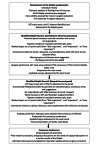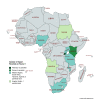Determining Critical Topics for Undergraduate Surgical Education in Rwanda: Results of a Modified Delphi Process and a Consensus Conference
- PMID: 37600431
- PMCID: PMC10433784
- DOI: 10.7759/cureus.43625
Determining Critical Topics for Undergraduate Surgical Education in Rwanda: Results of a Modified Delphi Process and a Consensus Conference
Abstract
Background Developing a contextually appropriate curriculum is critical to train physicians who can address surgical challenges in sub-Saharan Africa. An innovative modified Delphi process was used to identify contextually optimized curricular content to meet sub-Saharan Africa and Rwanda's surgical needs. Methods Participants were surgeons from East, Central, Southern, and West Africa and general practitioners with surgical experience. Delphi participants excluded or prioritized surgical topic areas generated from extensive grey and formal literature review. Surgical educators first screened and condensed identified topics. Round 1 screened and prioritized identified topics, with a 75% consensus cut-off based on the content validity index and a prioritization score. Topics that reached consensus were screened again in round 2 and re-prioritized, following controlled feedback. Frequencies for aggregate prioritization scores, experts in agreement, item-level content validity index, universal agreement and scale-level content validity index based on the average method (S-CVI/Ave) using proportion relevance, and intra-class correlation (ICC) (based on a mean-rating, consistency, two-way mixed-effects model) were performed. We also used arithmetic mean values and modal frequency. Cronbach's Alpha was also calculated to ascertain reliability. Results were validated through a multi-institution consensus conference attended by Rwanda-based surgical specialists, general practitioners, medical students, surgical educators, and surgical association representatives using an inclusive, participatory, collaborative, agreement-seeking, and cooperative, a priori consensus decision-making model. Results Two-hundred and sixty-seven broad surgical content areas were identified through the initial round and presented to experts. In round 2, a total of 247 (92%) content areas reached 75% consensus among 31 experts. Topics that did not achieve consensus consisted broadly of small intestinal malignancies, rare hepatobiliary pathologies, and transplantation. In the final round, 99.6% of content areas reached 75% consensus among 31 experts. The highest prioritization was on wound healing, fluid and electrolyte management, and appendicitis, followed by metabolic response, infection, preoperative preparation, antibiotics, small bowel obstruction and perforation, breast infection, acute urinary retention, testicular torsion, hemorrhoids, and surgical ethics. Overall, the consistency and average agreement between panel experts was strong. ICC was 0.856 (95% CI: 0.83-0.87). Cronbach's Alpha for round 2 was very strong (0.985, 95% CI: 0.976-0.991) and higher than round 1, demonstrating strong reliability. All 246 topics from round 4 were verbally accepted by 40 participants in open forum discussions during the consensus conference. Conclusions A modified Delphi process and consensus were able to identify essential topics to be included within a highly contextualized, locally driven surgical clerkship curriculum delivered in rural Rwanda. Other contexts can use similar processes to develop relevant curricula.
Keywords: consensus; delphi; medical school; rwanda; surgery curriculum.
Copyright © 2023, Alayande et al.
Conflict of interest statement
The authors have declared that no competing interests exist.
Figures
References
-
- Global surgery 2030: evidence and solutions for achieving health, welfare, and economic development. Meara JG, Leather AJ, Hagander L, et al. Lancet. 2015;386:569–624. - PubMed
-
- The specialist surgeon workforce in East, Central and Southern Africa: a situation analysis. O'Flynn E, Andrew J, Hutch A, et al. World J Surg. 2016;40:2620–2627. - PubMed
-
- The Lancet Commission on Global Surgery Global surgery 2030: evidence and solutions for achieving health, welfare and economic development. Meara JG, Greenberg SL. Surgery. 2015;157:834–835. - PubMed
-
- COSECSA: College of Surgeons of East, Central and Southern Africa strategic plan 2021-2025. [ Jun; 2023 ]. 2021. http://www.cosecsa.org/wp-content/uploads/2021/01/COSECSA-Strategic-Plan... http://www.cosecsa.org/wp-content/uploads/2021/01/COSECSA-Strategic-Plan...
-
- Scaling up a surgical residency program in Rwanda. Rickard J, Ssebuufu R, Kyamanywa P, Ntakiyiruta G. East Centr Afr J Surg. 2016;21:11–23.
LinkOut - more resources
Full Text Sources




